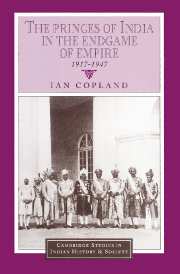Conclusion
Published online by Cambridge University Press: 30 October 2009
Summary
I fear that nothing could have saved them.
Paul Patrick, 1956During the nineteenth and early twentieth centuries, huge tracts of territory in Asia and Africa inhabited by hundreds of millions of people came under the control of governments led and directed by tiny handfuls of white men – some, mere boys in uniform. The whites held sway, against the odds, in part because they enjoyed a decisive military edge over the locals and were ruthless in their coercion of those who dared to resist them, but mostly because their rule was actively supported by significant sections of the local landed, religious and intellectual elites.
In the context of the Indian Empire, the most conspicuous example of such collaboration was the alliance that was forged between the British and the 600–odd surviving descendants of the subcontinent's former ruling dynasties – the ‘native princes’. Time and again, at critical junctures, the princes showed themselves loyal and useful friends. In the revolt of 1857–8, during the anti-partition agitation of 1905, in the war crises of 1914 and 1939, during the Quit India movement of 1942, princely money, princely forces and princely charismatic authority lent vital material and moral support to the imperial cause. Conversely, no other group of Indians was so consistently and fulsomely feted by the British. In 1858 and 1918, their services were recognised with land grants. A special royal order – the Star of India – was created especially to honour them. They had privileged access to viceroys and secretaries of state. Ganga Singh of Bikaner was the first Indian added to Lloyd George's war cabinet, Hamidullah of Bhopal the first Indian raised to the rank of air vice-marshal.
- Type
- Chapter
- Information
- The Princes of India in the Endgame of Empire, 1917–1947 , pp. 269 - 287Publisher: Cambridge University PressPrint publication year: 1997



